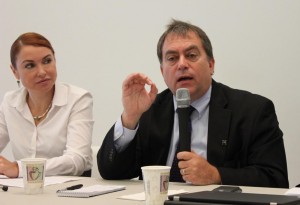New guide seeks to protect journalists in the field and online
|
WASHINGTON – Sometimes journalists need to act a little outside their job description to protect themselves. “Honestly, it feels a bit like pretending to be a spy,” said Danny O’Brien, the San Francisco-based Internet advocacy coordinator for the Committee to Protect Journalists. To help journalists assess and prevent threats to themselves and sources, CPJ released its Journalist Security Guide on April 26. A panel discussed the guide Wednesday at an event hosted by CPJ and Internews, both non-profits that promote free press. The deaths of New York Times reporter Anthony Shadid and The Sunday Times reporter Marie Colvin earlier this year in Syria are examples of the risks journalists take.
